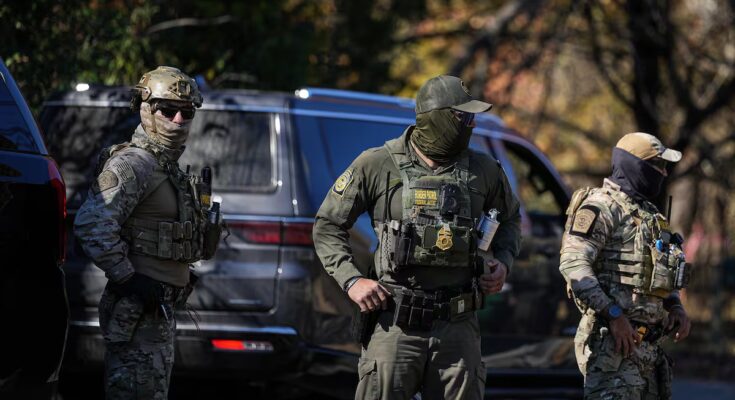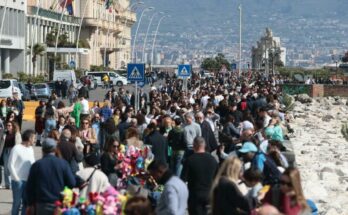Charlotte, North Carolina’s largest city, has become the latest priority target of the Donald Trump administration’s anti-immigration offensive. Border Patrol agents began operations Saturday to detain as many migrants as possible, spreading fear in the streets of this Democratic-controlled city of 950,000.
The Department of Homeland Security justified the operation as an increase in surveillance to fight crime, even though violent crime fell 20 percent over the year and local leaders resisted its intervention. The city’s acting mayor, Danté Anderson, told CNN that “Charlotte is a safe city. There’s nothing to see here, there’s no reason for them to be safe” and noted that the officers’ arrival spread fear and anxiety among residents.
The head of the US Customs and Border Protection is responsible for the operation. (CBP) Gregory Bovino, who conducted similar operations in the cities of Los Angeles and Chicago and whose brutal methods, including excessive force and the use of chemical weapons against the population, have been the subject of lawsuits.
The official, originally from North Carolina, boasted on social networks about the first day of the operation, which they gave the name Charlotte’s Web (namesake of the well-known children’s book by EB White), arrested more than 80 people.
Similar to what already happened in Chicago, in their previous arrest, the immigration agents, masked and aboard camouflaged vehicles according to several witnesses, used violent techniques in their arrests, in which they were inspired by racial profiling, as testified by the governor of North Carolina, the Democrat Josh Stein.
“We saw masked and heavily armed officers dressed in paramilitary garb driving unmarked cars, detaining American citizens based on skin color, engaging in racial profiling, and arresting people at random in parking lots and on sidewalks,” Stein said in a video released Sunday evening. “This doesn’t make us safer. It’s spreading fear and dividing our community.” Stein asked residents to record videos if they witness anything irregular to report it to local police.
The recordings made by the prisoners themselves and by witnesses of the operations have already flooded social networks, showing once again the aggressiveness with which the officers act, breaking the windows of the vehicles and abruptly throwing the prisoners to the ground to immobilize them.
One of the recordings shows the arrest of a US citizen, Willy Wender Aceituno Medina, who an officer forced out of his car after breaking the window glass with a truncheon. Of Honduran origin, but nationalized American, Aceituno Medina explained to the media that the agents had already stopped him once to ask for his documents, but let him go when they verified that he was American. The second time they interrogated him, however, they did not allow him to show his identity documents, even though he repeated that he was a citizen, and forced him into a vehicle with other detainees, then released him. The violence with which they treated him left bruises. The man claimed that they stopped him because of his physical appearance, since there were other people with him who were not Latino and were not required to show identification.
It’s unclear how long the operation in Charlotte will last or why it was chosen as Chicago’s successor for Border Patrol operations. Trump has ordered the deployment of National Guard and immigration agents to Democratic-ruled cities on the grounds that they are suffering a security crisis, despite the fact that in all cases statistics show otherwise. In Charlotte, homicides will decrease by 24 percent, violent assaults by 19 percent, and robberies by 22 percent by 2025.
The Department of Homeland Security said it is focusing on North Carolina because of so-called sanctuary policies, which limit cooperation between local authorities and immigration agents. The agency said “nearly 1,400 inmates in North Carolina went unserved, allowing for the release of undocumented immigrants with criminal records.” Him sheriff of Mecklenburg County, Garry McFadden, where Charlotte is located, ended the county’s partnership with Immigration and Customs Enforcement (ICE) in 2018.
In September, the city made headlines for the stabbing of a 23-year-old Ukrainian woman on public transportation by a man with a long history of arrests and mental health problems. Although the arrested suspect is a U.S. citizen, Trump used the killing as an example of what he described as uncontrolled crime in Democratic cities.
“Americans must be able to live without fear that illegal immigrants who commit sexual crimes will harm them, their families, or their neighbors,” Deputy Homeland Security Secretary Tricia McLaughlin said in a statement. “We are strengthening the Department of Homeland Security law enforcement presence in Charlotte to keep Americans safe and eliminate threats to public safety.”
And while in North Carolina the authorities and a large part of the population reject the presence of Bovino and his men, in Chicago they celebrate his departure, even if the CBP troops will still remain in the Illinois city. Chicago Mayor Brandon Johnson said last week that Bovino’s officers left behind “a trail of tears and chaos.” The raids of Operation Blitz halfway The result was more than 3,000 detainees, although a judge later ordered the release of hundreds of those arrested. The officers, led by Bovino, a fierce advocate of more violent arrest methods, fired tear gas and pepper bullets at residents, including children.



